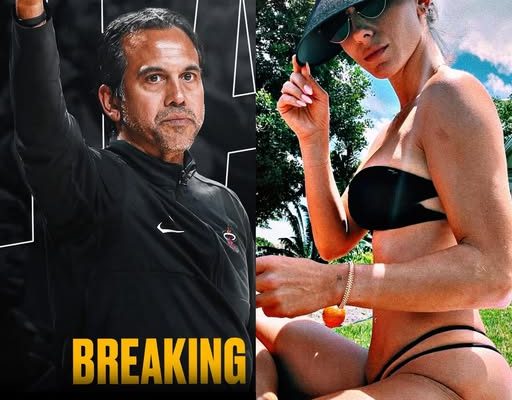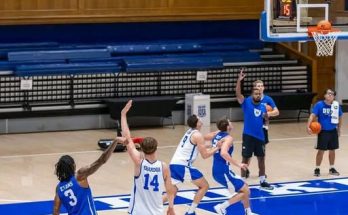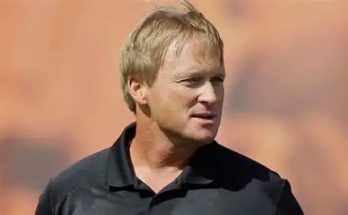The Miami Heat are widely respected around the league for their no-nonsense attitude, their commitment to excellence, and above all, their fiercely guarded “Heat Culture.” But every so often, something happens that reminds fans and insiders alike just how different this franchise truly is. One such moment? The quiet, deliberate decision by the Heat’s top brass to wait until head coach Erik Spoelstra had finalized his divorce before finalizing and announcing a massive \$120 million contract extension. That’s not just professional courtesy. That’s personal loyalty. That’s Heat Culture.
Spoelstra is more than just a coach in Miami—he’s an institution. A man who worked his way up from the video room to the helm of one of the NBA’s most iconic franchises. He’s navigated the turbulent waters of the LeBron-Wade-Bosh superteam era, he’s weathered roster transitions, he’s redefined the team’s identity year after year—and through it all, he’s carried himself with a quiet, humble dignity. So, when it came time to reward him with the richest coaching contract in NBA history, the Miami Heat chose to do it on their terms: with discretion, patience, and respect.
In the fast-paced, hyper-competitive world of professional sports, most organizations would have rushed to announce a record-breaking deal for their head coach. It’s the kind of move that grabs headlines, reassures fans, and reinforces organizational stability. But not the Heat. Not Pat Riley. They saw a different path—one rooted in a personal understanding of Spoelstra’s circumstances. He was going through a divorce, an intensely private and emotionally taxing process. Rather than overshadowing or complicating that already difficult chapter of his life, the Heat chose to wait. They prioritized the man behind the clipboard over the press release.
That move might sound minor to outsiders, even inconsequential in a business where millions are traded daily and players come and go like tides. But for those familiar with the inner workings of the Heat, it was a masterclass in what the organization stands for. Spoelstra’s loyalty to the franchise—through good times and bad, through rebuilds and Finals runs—was not just acknowledged with a financial package. It was honored with patience, empathy, and timing.
Heat Culture has always been about more than wins and losses. It’s about accountability, toughness, professionalism, and mutual respect. From Udonis Haslem’s decades-long role as enforcer and mentor, to the seamless transition from Dwyane Wade’s era to Jimmy Butler’s leadership, to the development of undrafted gems like Gabe Vincent, Max Strus, and Caleb Martin, the Heat operate with a deliberate and cohesive philosophy. It’s not performative—it’s ingrained. So when news eventually broke that Spoelstra had signed a staggering eight-year, \$120 million extension—making him one of the highest-paid coaches not just in the NBA but across all sports—it didn’t just reflect his coaching acumen. It reflected the trust, camaraderie, and family-style values that define the organization.
To fully appreciate the significance of this gesture, it’s important to understand Spoelstra’s relationship with the franchise. He’s been with the team since 1995, starting as a video coordinator. His grind has been legendary. Over time, he gained the confidence of Pat Riley, the architect of Heat Culture, and eventually succeeded Riley as head coach in 2008. He was just 37 years old, tasked with leading a team that would soon transform into one of the most scrutinized in NBA history. Spoelstra didn’t buckle under pressure. He rose.
Under Spoelstra, the Heat have made two distinct Finals runs—first with the Big Three and again with the scrappy, defense-first roster that battled through the 2020 NBA Bubble and returned in 2023 with an improbable run from the Play-In tournament. Through it all, he’s stayed calm, precise, and forward-thinking. His rotations are surgical. His adaptability is elite. And his ability to motivate players, whether they’re superstars or undrafted rookies, is unmatched. He’s a coach’s coach—and a player’s coach rolled into one.
So, when news of his divorce became public, it didn’t dominate headlines—because Spoelstra’s life has never been tabloid fodder. But those close to the team knew. And the Heat knew. They didn’t need to make a spectacle out of his personal life. They didn’t force a timeline. They waited, giving him space to navigate a chapter that few would want played out under the glare of NBA media.
And then, when the time was right, they moved. Quietly. Efficiently. Respectfully. That’s how the Heat do business.
This episode also sheds light on the unique synergy between Pat Riley and Erik Spoelstra. Riley is one of the most revered figures in the history of basketball—both as a coach and an executive. He’s as tough as they come. He demands excellence. But he also understands the value of personal investment. Spoelstra was his hand-picked successor, and their relationship has been one of mutual trust and high expectations. Riley didn’t just hand the keys to the franchise over to Spoelstra—he mentored him, backed him through criticism, and watched him evolve into one of the most respected minds in basketball. That shared journey adds another layer to the decision to wait on the contract extension. It wasn’t business—it was personal.
What’s perhaps most compelling is that this kind of culture isn’t easily replicated. Many teams throw around buzzwords like “family,” “togetherness,” and “trust,” but it’s the day-to-day actions—the subtle decisions, the unpublicized gestures—that define an organization’s soul. The Heat have built something durable, something real. And the way they handled Spoelstra’s extension is a living, breathing example of that ethos.
There’s also a larger message being sent across the league. For players, coaches, and even agents watching from afar, it signals that Miami is a place where people matter. Where excellence is rewarded, but not at the cost of humanity. Where you can bring your whole self to the table and not just be treated like a cog in the machine. That message resonates in locker rooms. It travels. And in an NBA landscape often dominated by transactional moves and impersonal shifts, it stands out like a lighthouse in a storm.
Of course, this story also has major implications for the future. With Spoelstra locked in for nearly a decade, the Heat have preserved one of their greatest assets. Continuity is a rare luxury in modern professional sports, and Miami has now secured it at the highest level. Spoelstra’s presence ensures that the Heat’s defensive tenacity, player development excellence, and tactical brilliance will remain their identity well into the future.
For Heat fans, this extension wasn’t just a celebration of Spoelstra—it was a reinforcement of the franchise’s commitment to values that stretch beyond the hardwood. It confirmed that Miami isn’t chasing trends. They’re setting standards. They’re not reacting to the noise. They’re orchestrating a symphony of culture, character, and competition.
And for Spoelstra himself, it’s a reminder that loyalty still counts for something in this league. That showing up year after year, doing the hard work, leading with grace and grit—those things don’t go unnoticed. He didn’t need a public campaign. He didn’t need to leak information to the press. He just needed to be himself. And the organization responded in kind.
The \$120 million isn’t just a number. It’s a symbol. Of trust. Of stability. Of brotherhood. And perhaps most importantly, of belief.
So yes, the Miami Heat waited until Erik Spoelstra’s divorce proceedings were finalized before they gave him the richest coaching deal in NBA history. And yes, that seems unusual—maybe even unorthodox. But it was real. It was human. And it was everything Heat Culture was built on.



